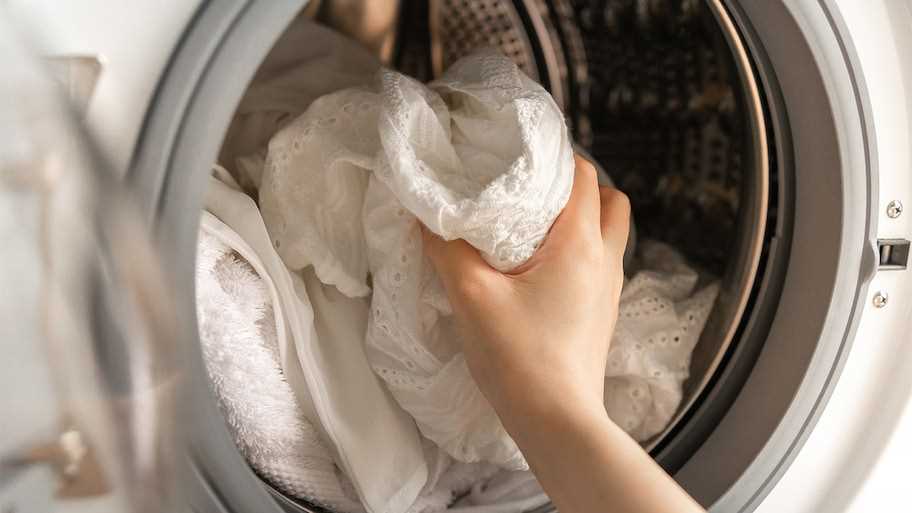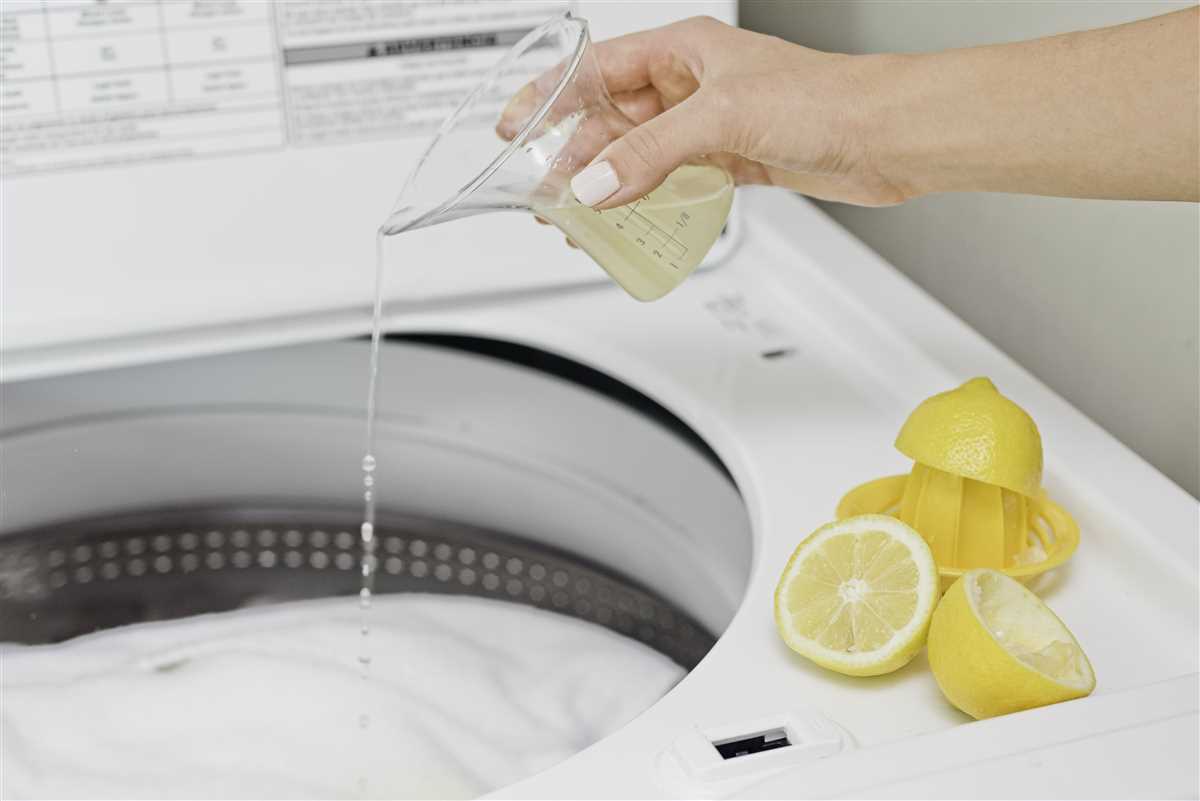


When it comes to doing laundry, most people rely on traditional laundry detergent to get their clothes clean. However, you may be surprised to learn that you can use lemon juice as a natural alternative in the washing machine. Not only does lemon juice leave your clothes smelling fresh and clean, but it also has a number of surprising benefits for your laundry.
One of the major benefits of using lemon juice in the washing machine is its natural bleaching properties. Lemon juice acts as a natural bleach, helping to remove stains and brighten your whites. Simply add a half cup of lemon juice to your wash cycle and watch as your clothes come out looking brighter and more vibrant. Plus, lemon juice is a safer and more environmentally friendly option compared to chemical bleaches.
In addition to its bleaching properties, lemon juice can also help to remove odors from your clothes. The natural acids in lemon juice break down and neutralize unpleasant smells, leaving your clothes smelling fresh and clean. Whether you’re dealing with musty towels or smelly gym clothes, a little lemon juice can go a long way in eliminating odors.
Finally, lemon juice can help to soften your clothes without the need for fabric softeners. The citric acid in lemon juice works as a natural fabric softener, leaving your clothes feeling softer and more comfortable against your skin. Simply add a half cup of lemon juice to the rinse cycle, and enjoy the benefits of soft, cozy clothes without the use of harsh chemicals.
In conclusion, using lemon juice in the washing machine can provide a number of surprising benefits for your laundry. From its natural bleaching properties to its ability to remove odors and soften fabrics, lemon juice is a versatile and environmentally friendly alternative to traditional laundry detergents. So next time you do your laundry, consider giving lemon juice a try and experience the fresh, clean results for yourself.
Benefits of Using Lemon Juice in the Washing Machine
Fresh, clean scent: One of the main benefits of using lemon juice in the washing machine is its refreshing scent. Lemon juice has a natural and pleasant fragrance that can help mask any unpleasant odors in your laundry. This can leave your clothes smelling fresh and clean.
Natural stain remover: Lemon juice is an effective natural stain remover. It contains citric acid, which can help break down and remove tough stains from your clothes. Simply add lemon juice to your laundry detergent and let it soak before washing. For even better results, you can also rub the stained area with lemon juice before washing.
Brighter whites: Another benefit of using lemon juice in the washing machine is that it can help make your whites brighter. Lemon juice has natural bleaching properties, which can help remove yellowing and dinginess from white fabrics. Add lemon juice to the wash cycle or soak your whites in a mixture of lemon juice and water before washing to achieve brighter results.
Antibacterial properties: Lemon juice has antibacterial properties that can help kill off germs and bacteria on your clothes. This can be especially beneficial if you have items that are heavily soiled or have been exposed to bacteria, such as workout clothes or baby clothes. Adding lemon juice to the washing machine can help ensure a thorough and hygienic clean.
Safe and natural alternative: Lemon juice is a safe and natural alternative to traditional laundry products that may contain harsh chemicals. It is gentle on fabrics and can be used for both regular and delicate items. Additionally, lemon juice is eco-friendly and can help reduce your carbon footprint by avoiding the use of chemical-laden laundry detergents.
Natural Stain Removal

One of the biggest benefits of using lemon juice in the washing machine is its natural stain removal properties. Lemon juice is acidic and contains natural bleaching agents that can help lift and remove stubborn stains from clothing.
How to Use Lemon Juice for Stain Removal

Here is a simple method to use lemon juice for stain removal:
- Squeeze Fresh Lemon Juice: Start by squeezing fresh lemon juice into a bowl.
- Apply to the Stain: Use a cotton ball or cloth to apply the lemon juice directly to the stain.
- Let it Sit: Allow the lemon juice to sit on the stain for about 10-15 minutes to allow it to penetrate and break down the stain.
- Rinse and Wash: Rinse the stained area with water and then proceed to wash the garment as usual.
Benefits of Using Lemon Juice for Stain Removal
Using lemon juice for stain removal offers several advantages:
- Natural and Chemical-Free: Lemon juice is a natural alternative to harsh chemical stain removers, making it a safer option for those with sensitive skin.
- Effective on Various Stains: Lemon juice can be effective in removing a wide range of stains, including grass stains, wine stains, coffee stains, and more.
- Brightens Whites: Lemon juice has natural bleaching properties that can help brighten white clothing, making them appear cleaner and fresher.
- Fresh Citrus Scent: Lemon juice leaves behind a fresh, citrus scent on the clothing, eliminating any unpleasant odours.
Overall, using lemon juice in the washing machine for stain removal is a natural, cost-effective, and eco-friendly way to keep your clothes looking clean and stain-free. Give it a try and see the surprising benefits for yourself!
Fresh Scent Boost

Adding lemon juice to your washing machine can provide a fresh scent boost to your laundry. The natural citrus fragrance of lemon juice can help eliminate unpleasant odors and leave your clothes smelling clean and crisp.
To use lemon juice as a scent boost, simply add a cup of freshly squeezed lemon juice to your washing machine drum along with your regular detergent. The lemon juice will not only add a pleasant fragrance but also help to brighten whites and remove stains.
You can also create a lemon juice fabric softener by mixing equal parts lemon juice and water. Pour the mixture into the fabric softener dispenser of your washing machine or add it during the rinse cycle. This will give your clothes a subtle lemon scent as well as help to soften and reduce static cling.
Alternatively, you can soak your clothes in a mixture of lemon juice and water before washing them. This can be particularly effective for removing tough stains, such as grease or sweat stains. Simply fill a basin or sink with water and add the juice of two lemons. Let the clothes soak for about 30 minutes before transferring them to the washing machine for a regular wash.
It’s important to note that lemon juice may cause discoloration or fading on certain fabrics, especially when exposed to sunlight. It’s best to test a small, inconspicuous area of the fabric before using lemon juice on the entire garment.
Tips for Using Lemon Juice in the Washing Machine:

- Always dilute the lemon juice with water before adding it to the washing machine.
- Use freshly squeezed lemon juice for the best results.
- Consider adding a few drops of lemon essential oil to enhance the scent.
- If you don’t have fresh lemons, you can use bottled lemon juice, but make sure it is pure and does not contain added sugars or preservatives.
- For heavily soiled or smelly clothes, you can add a few drops of lemon essential oil directly to the washing machine drum before starting the wash cycle.
By using lemon juice in your washing machine, you can enjoy the fresh scent of lemons on your clothes without the use of synthetic fragrances. Give it a try and see the surprising benefits for yourself!
Brightens Whites
Lemon juice can be a natural and effective way to brighten whites in your laundry. It can help remove stubborn stains and discoloration, leaving your white clothes looking fresh and bright.
To use lemon juice to brighten whites:
- First, squeeze fresh lemon juice into a small bowl.
- Next, add the lemon juice to your washing machine along with your regular laundry detergent.
- Set your washing machine to the appropriate cycle for your clothes.
- Allow the washing machine to complete the cycle.
The citric acid in lemon juice acts as a natural bleach and can help remove yellowing and dinginess from white fabrics. It can also help prevent white clothes from becoming dull over time.
Note: Lemon juice is safe to use on most white fabrics, but it’s always a good idea to spot test a small, inconspicuous area of the garment before using it on the entire item.
Gentle on Fabrics
Lemon juice is a natural and gentle alternative to harsh laundry detergents. It can help to remove tough stains without damaging delicate fabrics. The acidity of lemon juice helps to break down and dissolve dirt, grease, and grime, leaving your clothes clean and fresh.
Using lemon juice in the washing machine is especially beneficial for delicate fabrics such as silk, wool, and lace. These fabrics require a gentle touch, and lemon juice provides a safe and effective solution. It brightens and refreshes the fabric without causing any damage or fading.
Additionally, lemon juice can help to remove unpleasant odours from fabrics. It acts as a natural deodorizer, eliminating bad smells and leaving your clothes smelling clean and fresh. This makes it a great option for washing workout clothes, socks, and other items that tend to retain odours.
When using lemon juice in the washing machine, it’s important to dilute it properly. Simply squeeze the juice of a lemon into a cup of water and add it to your laundry detergent. You can also add a few drops of lemon essential oil for added fragrance and cleaning power.
Overall, using lemon juice in the washing machine is a gentle and effective way to clean your clothes, particularly delicate fabrics. Give it a try and experience the surprising benefits for yourself!
Environmentally Friendly Option
Using lemon juice in the washing machine is not only a natural and effective option for cleaning your clothes, but it also has several environmental benefits. Lemon juice is a renewable resource and does not contribute to pollution or waste like many synthetic laundry detergents do.
By using lemon juice, you can reduce your carbon footprint and help protect the environment. Synthetic laundry detergents often contain harmful chemicals that can pollute water systems and cause damage to aquatic life. Lemon juice, on the other hand, is biodegradable and poses no threat to the environment.
Additionally, lemon juice is a great alternative to fabric softeners, which often contain toxic ingredients. Lemon juice can naturally soften fabrics and leave your clothes smelling fresh without the need for harsh chemicals.
Furthermore, using lemon juice in the washing machine can help prolong the life of your clothes. Synthetic laundry detergents can be harsh on fabrics, causing them to wear out more quickly. Lemon juice is gentler on clothes and can help maintain their quality and color.
Overall, incorporating lemon juice into your laundry routine is a sustainable and environmentally friendly choice. Not only will it effectively clean your clothes, but it will also help protect the planet.
FAQ
Can lemon juice be used in the washing machine?
Yes, lemon juice can be used in the washing machine.
What are the benefits of using lemon juice in the washing machine?
There are several benefits of using lemon juice in the washing machine. Lemon juice acts as a natural bleaching agent, helping to remove stains and brighten clothes. It also has antiseptic properties, which can help kill bacteria and freshen up your laundry. Additionally, the acidic nature of lemon juice can help to remove odors.
How do you use lemon juice in the washing machine?
To use lemon juice in the washing machine, you can add about half a cup of lemon juice to the rinse cycle. This can help to brighten your clothes and remove stains. Alternatively, you can soak your clothes in a mixture of lemon juice and water before washing them. Just make sure to check the care labels on your clothes to ensure they are compatible with lemon juice.
Is it safe to use lemon juice in the washing machine on all types of fabrics?
While lemon juice is generally safe to use in the washing machine, it’s important to check the care labels on your clothes before using it. Some fabrics, such as silk or wool, may not be compatible with lemon juice and could be damaged. It’s always best to do a patch test on a small, inconspicuous area of the fabric before using lemon juice on the entire garment.











